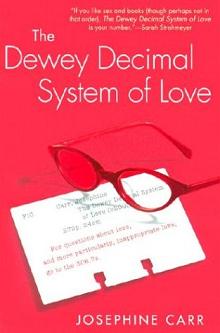The Dewey Decimal System of Love
Josephine Carr
Fiction (romance)
Reviewed by: Carrie Byrd
Review posted: 12/19/03
The Dewey Decimal System of Love starts off as a fun, light, romantic comedy. Sort of like reading, “You’ve Got Mail”. Unfortunately, the characters are not quite so likeable as Meg Ryan and Tom Hanks. This is an enjoyable book, but is not flawless.
Before I tell you about the story, I want to tell you about my absolute favorite part of the book. Each chapter begins with a Dewey Decimal reference to a book that relates to that section. It’s a fun, quirky, very librarian thing to do.
 The story begins and ends with librarian Allison Sheffield, a librarian who, after fifteen years of celibacy winds up entangled with her fantasy man, in love at last and completely confused. Her fantasy man is married to an ice queen, and she’s not terribly impressed with Allison’s painfully obvious crush on her husband. Allison’s closest friends are her married and highly domesticated college gal pal Susan and her boss Gordon, a womanizer who never seems to hurt the women he loves and leaves. Allison falls for Alexis, the gorgeous new conductor at the orchestra.
The story begins and ends with librarian Allison Sheffield, a librarian who, after fifteen years of celibacy winds up entangled with her fantasy man, in love at last and completely confused. Her fantasy man is married to an ice queen, and she’s not terribly impressed with Allison’s painfully obvious crush on her husband. Allison’s closest friends are her married and highly domesticated college gal pal Susan and her boss Gordon, a womanizer who never seems to hurt the women he loves and leaves. Allison falls for Alexis, the gorgeous new conductor at the orchestra.
Beyond Susan and Gordon lays a whole host of secondary characters. Allison’s flamboyant mother, her father, who has suddenly fallen for a woman younger than Allison, Ed, an unusual library patron, Yvonne, a library employee in the middle of an identify crisis and so on. The characters crowd into the relatively short book (clocking in at a slim 272 pages) and overwhelm it.
In a way, the secondary characters both make and break this book. They create moments where Allison must deal with issues that are real and touching and frankly, hilarious. I embarrassed myself in Starbucks by laughing so hard I almost snorted hot cocoa up my nose. However, there are so many secondary characters, and so many subplots, that the “real” story winds up getting a little lost in the shuffle at times, and Carr misses out on opportunities to flesh out the main plot because she is sidetracked by the other ten plots she’s got running.
I mentioned before that I didn’t find the characters particularly likable, and this applies especially to the heroine (and narrator) of the story. She talks too much about her body, which is repeatedly described as gorgeous. After fifteen years of being happy alone, her lifestyle is invalidated by a man she’s met maybe two times. She gets Lasik surgery so she won’t have to wear her glasses. She cuts her hair. She buys beauty supplies. Frankly, I found her kind of insulting. There's nothing wrong with doing any of these things, but to do them so you can catch a man? No. This was an opportunity to show that someone who was alone could fall in love and still be themselves, and instead Carr chose to show that falling in love meant subverting yourself. Here’s a lesson girls – you can be pretty and smart and happy with who you are - but if you want to catch a man, you have to be tarty and learn how to simper as well.
Another problem that plagued this book is that Carr seems to be unsure of her genre. With all the subplots, she could easily have created a simple slice of life story, and called it a job well done. The romance overpowered the slice of life element, but couldn’t hold it’s own. In addition, she tried to make it into a story of self-discovery, but the character who was making all the discoveries was not terribly likable, and it got too tangled up in all the other elements. She attempted to add a hint of mystery, and that turned it into a jumbled mess, getting worse the closer we got to the end. The bizarre conclusion left me bewildered, and wondering if I had accidentally switched books, or stumbled onto a weirdly misprinted edition. Unfortunately, this was not the case.
This is weirdly jumbled book, filled with things to love and things to hate. Would I recommend it to someone else? Probably. Will I ever read it again myself? Probably not.
|




 The story begins and ends with librarian Allison Sheffield, a librarian who, after fifteen years of celibacy winds up entangled with her fantasy man, in love at last and completely confused. Her fantasy man is married to an ice queen, and she’s not terribly impressed with Allison’s painfully obvious crush on her husband. Allison’s closest friends are her married and highly domesticated college gal pal Susan and her boss Gordon, a womanizer who never seems to hurt the women he loves and leaves. Allison falls for Alexis, the gorgeous new conductor at the orchestra.
The story begins and ends with librarian Allison Sheffield, a librarian who, after fifteen years of celibacy winds up entangled with her fantasy man, in love at last and completely confused. Her fantasy man is married to an ice queen, and she’s not terribly impressed with Allison’s painfully obvious crush on her husband. Allison’s closest friends are her married and highly domesticated college gal pal Susan and her boss Gordon, a womanizer who never seems to hurt the women he loves and leaves. Allison falls for Alexis, the gorgeous new conductor at the orchestra.